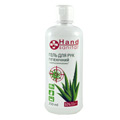Hand Sanitar Hygienic Hand Gel with Antiseptics, 250 ml |
hand sanitisers
Results 1 - 1 of 1
Thoroughly washing your hands with soap is the best way to protect yourself from pathogenic microorganisms. Unfortunately, it is not always possible to wash your hands; for example, it isn’t easy to observe basic hand hygiene when travelling or during camping trips, where the likelihood of becoming infected with something is greater than in everyday life. In such situations, hand sanitiser comes to the rescue.
Hand sanitisers are also known as hand antiseptics, hand disinfectants, hand rubs or handrubs. Most of them are formulated with alcohol, either ethanol or isopropyl alcohol. To effectively combat microbes, the concentration of alcohol in hand sanitiser must be at least 60%. In the United States, ethanol or isopropyl alcohol based solutions used for antiseptic purposes are often referred to as rubbing alcohol; they typically contain 70% alcohol, which is enough to kill 99.9% of the bacteria on hands in 30 seconds.
Alcohol is one of the best disinfectants, but it has several drawbacks. A lot of people consider its tendency to dry the skin the biggest drawback. For this reason, manufacturers infuse hand sanitisers with moisturising ingredients, which help to lock in moisture, prevent skin redness and flaking, and soften the skin. The most common emollient found in hand antiseptics is glycerol (it is one of the four ingredients of the WHO-recommended hand sanitiser), but some manufacturers use other emollients instead of or alongside glycerine, such as propylene glycol or aloe vera gel.
Another drawback of alcohol is its harsh smell. To mask it, hand sanitisers usually contain synthetic fragrances or natural essential oils. Essential oils are considered the better option, since they not only give hand sanitisers a light and pleasant aroma, but also improve their disinfectant properties, as all essential oils are natural antiseptics effective against certain bacteria, viruses and fungi. However, you should keep in mind that essential oil can cause skin irritation in people with allergies or sensitive skin. Therefore, it is safer to choose hand sanitisers with oils that are considered the least allergenic, such as tea tree oil or lavender oil.
To protect yourself from infections, you need to use hand sanitiser correctly. The World Health Organisation (WHO) recommends applying sanitiser to the entire surface of your hands, including between the fingers, and rubbing it in for at least 20–30 seconds. Otherwise, it won’t provide enough protection. If you use alcohol-based hand sanitiser on a regular basis, you should regularly moisturise your hands in order to prevent dryness, flaking, and contact dermatitis.
Hand sanitisers come in various forms, including liquids, sprays, gels, and wipes. Liquid antiseptics in large bottles are typically used in medical settings, such as hospitals and healthcare facilities, whereas sprays and gels in smaller bottles are designed for everyday use. Antiseptic wipes aren’t considered the best option, because alcohol evaporates easily, and if you don’t seal the pack properly after taking out a wipe, they will quickly become useless.
Antiseptic sprays are easier to use as you go, but antiseptic gels are considered more effective due to their viscous consistency. Hand sanitiser gels are easier to spread over the skin without missing a spot. In addition, gels usually contain more emollients than sprays and therefore dry hands less. But it doesn’t mean that they contain less alcohol: both gels and sprays must contain at least 60% alcohol. It’s just that gels contain more glycerine than water, and vice versa.
In our online shop Organic Store, you can buy hand sanitiser gels and sprays produced by trustworthy manufacturers, such as Green Pharmacy and Hand Sanitar. These alcohol-based antiseptics are infused with aloe vera extract, essential oils and other natural ingredients; they absorb quickly and don’t leave the skin feeling sticky. Compact sanitisers will easily fit in your pocket or purse, so you can carry them around wherever you go. They will come to the rescue when you don’t have access to water and soap, and protect you from germs anytime, anywhere.
